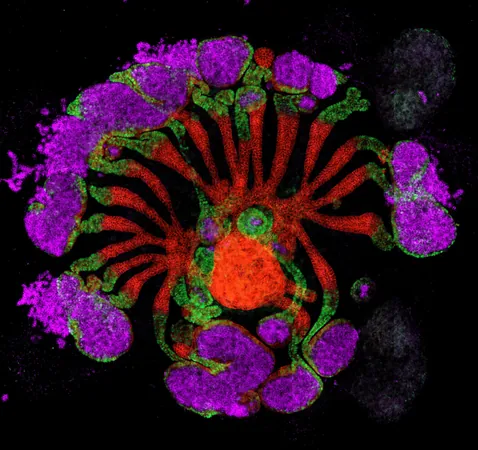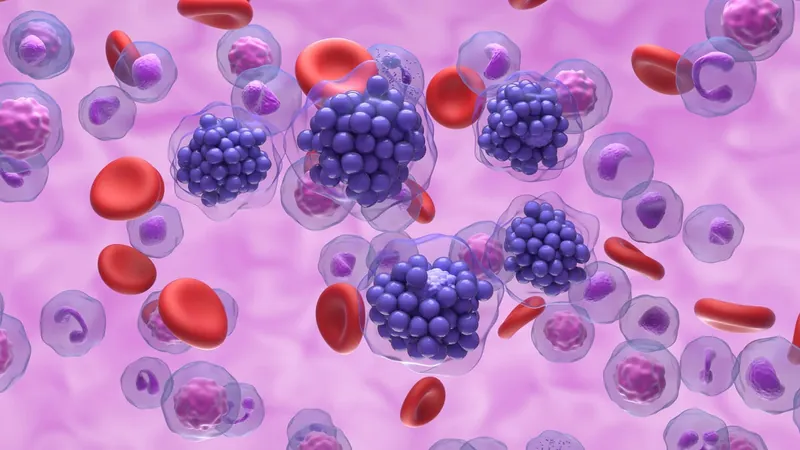
Revolutionary Breakthrough: Lab-Grown Kidneys Make Huge Strides Towards Synthetic Organ Transplants
2025-09-17
Author: Arjun
A Major Leap in Synthetic Kidney Development
In an exciting advancement, researchers at USC Stem Cell are one step closer to creating synthetic kidneys for both mice and humans. Their groundbreaking study, published in Cell Stem Cell, introduces sophisticated lab-grown kidney structures that are more mature and complex than anything seen before.
Transforming Kidney Disease Research
Lead author Zhongwei Li, an associate professor at USC's Keck School of Medicine, highlighted the significance of this development: "This is a revolutionary tool for creating more accurate models for studying kidney disease, which impacts one in seven adults. It's a crucial milestone toward our long-term goal of engineering functional synthetic kidneys for over 100,000 U.S. patients in need of transplants—the only viable cure for end-stage kidney disease."
Innovative Assembloids Created
The research team, guided by experts such as Biao Huang, Pedro Medina, and Zipeng Zeng, has successfully merged nephron and collecting duct components to create what they call "assembloids." These structures are a leap forward in mimicking actual kidney functions.
Growing Organoids in Real-Time
By optimizing conditions for these assembloids, the scientists transplanted them into living mice, where they began to mature, developing vital connective tissues and blood vessels. Li remarked, "Maturing the assembloids in a native environment allows us to harness kidney progenitor cells' natural self-assembly capabilities—this is crucial for creating functional synthetic kidneys."
Impressive Kidney-Like Functions Observed
Both the mouse and human assembloids demonstrated functions akin to real kidneys, including blood filtration, protein absorption, hormonal secretion, and preliminary urine production. Unlike previous organoids that only reached embryonic levels of development, these assembloids matured to a state comparable to newborn mouse kidneys, showcasing significant progress.
A Revolutionary Model for Kidney Diseases
The research also serves as proof that assembloids can accurately model human kidney diseases. For instance, human assembloids created from cells with a malfunctioning PKD2 gene—linked to a genetic disorder causing kidney cysts—developed large cysts and exhibited notable disease manifestations like inflammation and fibrosis in vivo.
A New Era for Kidney Research and Treatment
Li stated, "Our study provides a powerful new tool for exploring a myriad of complex kidney diseases alongside laying the groundwork for engineering functional synthetic kidneys—offering hope for patients in dire need of life-saving transplants." This groundbreaking research opens the door to transformative possibilities for kidney health and organ transplants.


 Brasil (PT)
Brasil (PT)
 Canada (EN)
Canada (EN)
 Chile (ES)
Chile (ES)
 Česko (CS)
Česko (CS)
 대한민국 (KO)
대한민국 (KO)
 España (ES)
España (ES)
 France (FR)
France (FR)
 Hong Kong (EN)
Hong Kong (EN)
 Italia (IT)
Italia (IT)
 日本 (JA)
日本 (JA)
 Magyarország (HU)
Magyarország (HU)
 Norge (NO)
Norge (NO)
 Polska (PL)
Polska (PL)
 Schweiz (DE)
Schweiz (DE)
 Singapore (EN)
Singapore (EN)
 Sverige (SV)
Sverige (SV)
 Suomi (FI)
Suomi (FI)
 Türkiye (TR)
Türkiye (TR)
 الإمارات العربية المتحدة (AR)
الإمارات العربية المتحدة (AR)